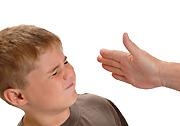Spare the rod, save lives
A new UNSW study suggests that a ban on smacking could prevent up to a third of child homicides.
A new UNSW study suggests that a ban on smacking could prevent up to a third of child homicides.

A ban on smacking in the home could prevent deaths arising from the physical abuse of children, which is the cause of more than a third of child homicides in NSW, a University of New South Wales (UNSW) study has found.
The study, by researchers from the UNSW School of Psychiatry and Sydney's St Vincent's Hospital, is published in the Medical Journal of Australia.
The study found child abuse was the reason for 59 (36 percent) of the 165 child homicides committed in NSW over the 15 years to 2005.
"The rate of child homicides in NSW is higher than other advanced countries, and 59 deaths from physical abuse in NSW is far too high," said one of the authors, Dr Olav Nielssen from UNSW's School of Psychiatry.
Data from Europe suggests the continued acceptance of domestic corporal punishment in NSW could be contributing to child deaths. Domestic corporal punishment is banned in most European nations.
"There were no child homicides due to physical abuse in the 15 years after the prohibition of corporal punishment in Sweden, despite a higher number of other forms of homicide," Dr Nielssen said.
The authors used NSW Bureau of Crime Statistics data, court judgments and media reports to identify the cases of child homicide.
Two thirds of the perpetrators of the homicides were men, who were often not the biological parent.
"Many were deeply remorseful immediately after the deaths. In most cases their intention was not to kill the child, only to discipline it, but they did not have the necessary parenting skills," said St Vincent's Hospital's Dr Matthew Large.
The researchers also found that 26 of the child homicides (16 percent) were committed during an acute psychotic episode.
"Most of these homicides occurred in the first episode of psychosis. The obvious recommendation is that early psychosis needs to be treated quickly," Dr Nielssen said.
"Mental health workers need to consider the safety of children in the care of mentally ill parents."
Media contact: Steve Offner | 02 9385 8107 | s.offner@unsw.edu.au